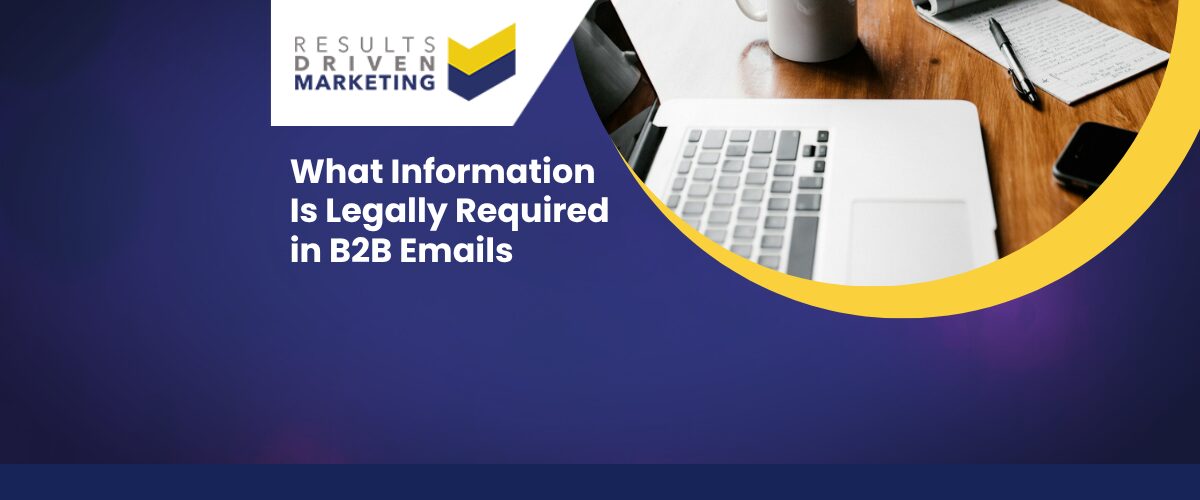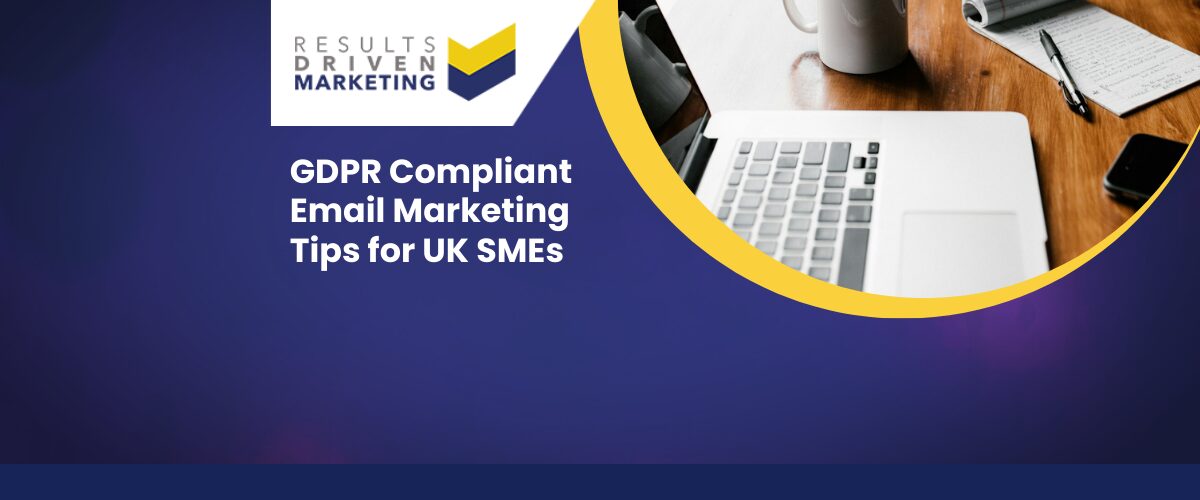
What Information Is Legally Required in B2B Emails
What information is legally required in B2B emails? It’s a question every SME decision-maker should be asking—especially when using purchased data for lead generation. With UK laws like GDPR and PECR in force, it’s no longer enough to send a well-written email. You also need to make sure it ticks all the legal boxes.
The trouble is, many businesses unintentionally miss the basics—forgetting to include company details, using vague subject lines, or not offering a clear opt-out. These small oversights can lead to big problems, from lost trust to complaints or fines.
In this post, we’ll walk you through the must-have legal elements every B2B marketing email should include. Whether you’re using Responder, Outlook, or a CRM system, you’ll learn exactly what needs to go in each message—so you can stay compliant, build credibility, and focus on results.
Table of contents:
Why Legal Compliance in B2B Emails Matters
What information is legally required in B2B emails is more than a checkbox exercise—it’s about protecting your business and your reputation. While B2B outreach is more flexible than B2C under UK law, you’re still responsible for meeting basic legal standards.
Here’s why it matters:
-
Avoid fines and formal complaints
Breaching rules under GDPR or PECR can lead to investigations or penalties from the ICO—especially if someone reports your email. -
Build trust and credibility
Including proper business details and opt-out options shows professionalism. It reassures prospects you’re a legitimate business—not just another spammer. -
Protect inbox placement and response rates
Emails missing legal information are more likely to get flagged by spam filters or ignored by decision-makers. A compliant structure helps your message land and be taken seriously.
Key Legal Requirements for B2B Email Content
What information is legally required in B2B emails under UK law comes down to four key areas. Get these right, and you’ll stay on the right side of both GDPR and PECR.
Identify Your Business Clearly
-
Include your full legal business name (and trading name if different)
-
Add your registered company number, if applicable (e.g., Ltd or LLP)
-
Provide your full registered office address—not just a PO box
Provide Accurate Contact Details
-
Include a valid reply-to email address or working phone number
-
Don’t hide behind no-reply addresses—give recipients a clear path to get in touch or raise concerns
Include a Simple Opt-Out Option
-
Add a visible and easy-to-understand unsubscribe option
-
This can be a one-click link or an email instruction (e.g., “Reply STOP to unsubscribe”)
-
Even in B2B, PECR requires recipients to have a clear way to opt out
Make Your Purpose Clear
-
Let the recipient know why they’re receiving the email
-
A simple line like “We’re reaching out to introduce our data services for UK SMEs” is enough
-
Transparency strengthens your legal position and earns respect from recipients
Common Compliance Mistakes to Avoid
Even well-meaning businesses can slip up. When asking what information is legally required in B2B emails, it’s just as important to know what not to do. Here are the most common mistakes that can cause issues:
Using Misleading Subject Lines or Sender Names
-
Don’t try to trick recipients into opening your email
-
Be clear and professional—avoid clickbait tactics or ambiguous names
Hiding or Obscuring Opt-Out Options
-
Burying the unsubscribe link in tiny font or vague wording (“click here for preferences”) won’t cut it
-
Make it easy and obvious—frustrated recipients are more likely to report your email
Forgetting Company Details in the Footer
-
Many cold emails leave out the registered address, trading name, or contact info
-
This looks unprofessional and breaches your legal obligations
Failing to Keep Templates Updated
-
If your company’s address, phone number, or domain changes, update your templates
-
Old information can lead to complaints or lost leads
What GDPR and PECR Expect from B2B Marketers
What information is legally required in B2B emails falls under two key UK regulations: GDPR and PECR. While they’re often mentioned together, they serve different purposes—and understanding both is crucial for compliance.
GDPR (General Data Protection Regulation)
-
Governs how personal data is processed and stored
-
Applies to B2B if your emails include names, direct emails, or personal job titles
-
You need a lawful basis to process this data—Legitimate Interest is most common for cold outreach
-
Transparency is key: you must explain who you are, why you’re contacting them, and how they can opt out
PECR (Privacy and Electronic Communications Regulations)
-
Specifically governs electronic marketing—emails, texts, phone calls
-
In B2B, you can send unsolicited marketing emails without prior consent, but…
-
The email must clearly identify the sender
-
It must offer a simple opt-out mechanism
-
The messaging must be relevant to the recipient’s role or responsibilities
-
Together, GDPR and PECR shape how B2B outreach is done legally. It’s not just about permission—it’s about clarity, accountability, and respecting the recipient.
Simple Compliance Checklist for Every B2B Email
If you’re wondering what information is legally required in B2B emails, here’s your quick, no-fluff checklist. Use this before every send—whether you’re launching a full campaign or emailing a single prospect.
✅ Include in Every Email:
-
Your full company name (plus trading name if different)
-
Registered office address (not a PO box)
-
Company registration number (if applicable)
-
Valid contact email and/or phone number
-
Clear unsubscribe option (e.g. one-click or “Reply STOP”)
-
Brief explanation of why the recipient is being contacted
Bonus Tips:
-
Make sure the information is easy to find—usually in the footer
-
Check templates regularly to keep contact info up to date
-
If you’re using a cold list, ensure it’s relevant and targeted to the recipient’s business role
Why Choose Results Driven Marketing
At Results Driven Marketing, we don’t just supply marketing data—we help you use it responsibly and effectively. If you’re unsure what information is legally required in B2B emails, we’ll guide you with clarity, not complexity.
-
Compliance built into our advice
Every client gets support on how to use data within GDPR and PECR guidelines—no guesswork needed. -
We think like marketers
We know time is tight. That’s why we explain legal essentials in plain English, not legal jargon. -
Support beyond the list
Need help crafting your cold outreach? We’ll talk you through best practices, from content to structure. -
Ready-to-use data
Our email lists are segmented, clean, and supplied with your outreach in mind—making compliance easier from the start.
You don’t need to be a legal expert to run a compliant email campaign. You just need the right partner. Contact us today if you want your next campaign to be both effective and above board.
Final Thoughts – Make Compliance Part of Your Email Strategy
What information is legally required in B2B emails isn’t just a regulatory checklist—it’s the foundation of a professional, effective outreach strategy. Whether you’re emailing 10 people or 10,000, getting the legal details right builds trust, protects your brand, and improves response rates.
To recap:
-
Always include clear company details, contact info, and a visible opt-out
-
Stay transparent about why you’re contacting the recipient
-
Follow GDPR and PECR guidance to stay compliant and credible
-
Use our checklist to make legal compliance a routine part of your email process
Don’t let legal uncertainty slow your sales down. With the right data and guidance, you can email confidently—and get results. Need help? Contact us for expert support or explore our email lists built for compliant outreach.
Results Driven Marketing
Helping UK SMEs go from bad data to more customers and profits
📍 Newcastle | 📞 0191 406 6399 | 🌐 rdmarketing.co.uk





